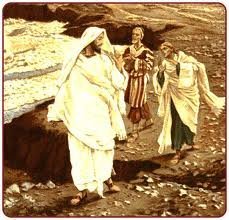Come and You Will See
In the first chapter of John there is
this exchange between the Apostle Andrew, one other disciple and Jesus:
And Jesus turned and
saw them following, and said to them, “What do you seek?” They said
to Him, “Rabbi (which translated means Teacher), where are You staying?” He
said to them, “Come, and you will see.” (John 1:38-39 NASB)
What an odd
response to Jesus's question - or at least it is to our Western ears. Should
not this first recorded question to Jesus have been a bit deeper? Perhaps
something along the lines of, "Are you the Messiah we have been searching
for?" or "When will Israel be redeemed and throw off Roman control?"
No, instead it is a question about where Jesus lives.
As Ravi Zacharias points out in his book "Jesus Among Other Gods", we have to remember the culture of Israel is Eastern not Western. Eastern culture puts far more emphasis on the group you are associated with than the individual.
We, in the West, look at the individual and what that person has done for themselves or others in order to ascertain their worth to society. In the East, it is where you are from, what your lineage is, who your parents are that dictates who you are rather than any individual gifts you may have. This is why the Bible is full of genealogies. The Bible is written primarily by Hebrews/Israelis who are Eastern in their outlook.
Therefore, where Jesus lived was extremely important to Andrew and his friend as that would tell them everything they would need to know about this teacher. His answer would tell them about His parents and upbringing. Then they could verify whether His words and actions had the proper pedigree - or so they thought.
Jesus turns the question around and gives them a non-answer, "Come, and you will see."
Not only does Jesus lead them to get out of the mental box their society has built for them, He lovingly prepares them for the tremendous revelation He has in store. For unlike Eastern cultural norms, Jesus wants a personal relationship with everyone. This is likely one of the reasons He did not, initially, talk to the Jews at a large gathering like Passover. The people would think Jesus was talking to them as a group rather than to each individual. People think they can get lost in groups and it is easier to “get away” with things – or so it seems at the time – but face to face with Jesus is another matter.
Jesus speaks to these two men and Andrew’s first action is to go to his brother, Simon, and say:
“We have found
the Messiah” (which translated means Christ). (John 1:41)
Jesus, it appears, did not argue with Andrew and his
friend nor did He try to justify Himself. He just drew them in and revealed
enough to prove who He is.
The fact the Bible does not share what happened
between Jesus and these two men is fascinating and wonderful. It is fascinating since we wonder what He
said or did. It is wonderful because we do not know what He said or did.
If we knew what He said or did, then we simple people
would take it as the ONLY answer for why Jesus is the Messiah. Instead, Jesus
reveals Himself to be the Messiah in infinite ways because we are all
different! Sometimes, it is through reading the Bible. Sometimes, it is through
hardship or a miracle. Other times it is because of the words of a faithful
Christin witness. Other times it is through creation itself (Romans 1:20).
There is no single answer. The implications of accepting (or not accepting) the
answer are profound for everyone. Jesus knows this far more than we realize
even though the question is very simple - "Are you the Messiah?"
We each have to come to that answer ourselves. Jesus reveals
Himself in a way that we can understand and relate to. This allows us the best
opportunity possible to make the best decision we will ever make - whether to
follow Jesus or not.
For those who choose not to follow Him, there will be no
doubt it is not the fault of Jesus but of each non-believer who is responsible
for the judgment they will receive. Jesus loves us far too much to not give
each of us the opportunity to make up our own mind.
For
God so loved the world, that He gave His only begotten Son, that
whoever believes in Him shall not perish, but have eternal life. (John
3:16)
Come and you will see!




Comments
Post a Comment